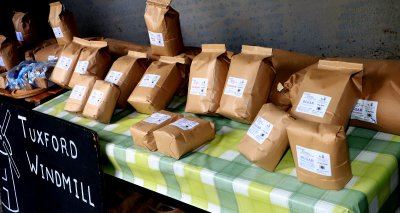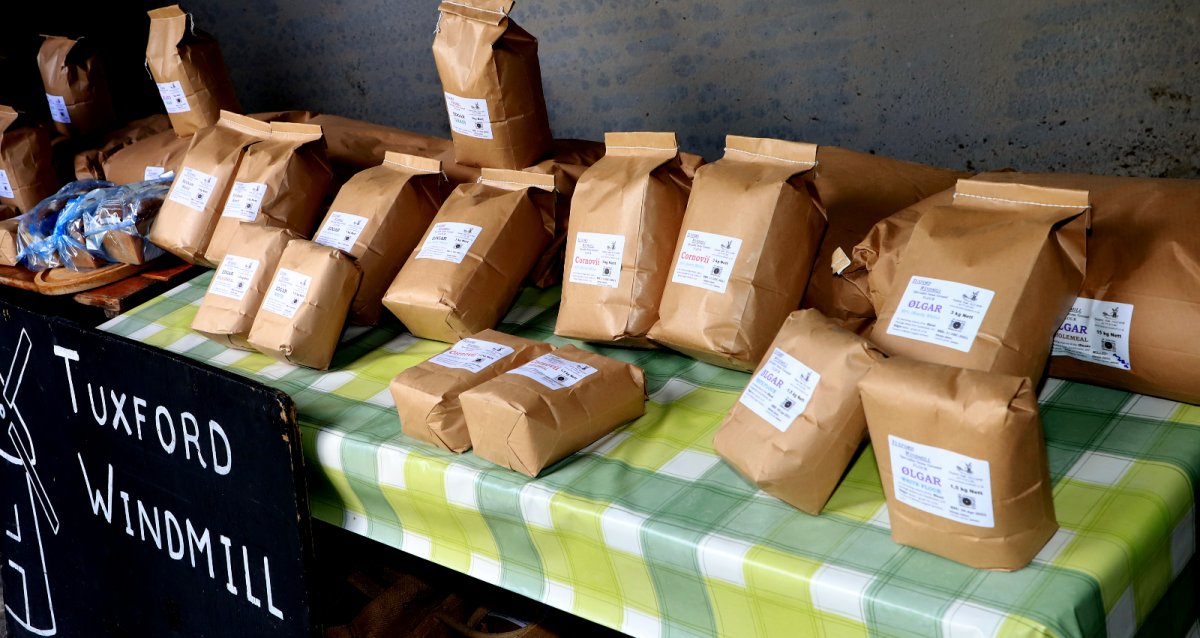 Tuxford Mill YQ grain flour. Credit: John Turner
Tuxford Mill YQ grain flour. Credit: John Turner
An adaptive approach to wheat breeding, growing, processing and baking - a farmers perspective
Farmer John Turner explains the huge benefits of population wheat - with heterogenous seed mixes, how processing and baking needs to shift and why we urgently need changes to UK seed law to allow more such approaches to diverse seed breeding.
We started our organic conversion in 1999 and despite all the planning, we hadn’t appreciated how incredibly distorted our existing known world of farming was and that we would have to do so much re-learning from first principles. We imagined the choice of cereal crops to grow would simply be a matter of selecting those bred with organic farming systems in mind, but we quickly realised that the whole system that governs the range of available seeds is simply no longer fit for purpose when it comes to meeting the needs of progressive organic and regenerative farming systems.
whole system that governs the range of available seeds is simply no longer fit for purpose
It’s worth explaining that the available choice of wheat or for that matter any crop is governed by law and must come from those varieties listed on the national register or from a recognised conservation variety. The central piece of legislation is the Plant Varieties and Seeds Act (1964) which had two principal areas of focus: First, it recognised plant breeders’ rights in terms of intellectual property and second, it established an index of names of varieties and the imposition of restrictions which control the introduction of new varieties. Also, working in association, there were standards relating to the quality of the seed, such as germination, absence of weed seeds and seed health.
The objectives of the act were worthy since it ensured growers could buy seed with confidence, knowing the purity of the crop and its likely performance. It also ensured that there were mechanisms that supported the work of the plant breeder. The early 1960s, when the legislation was developed, also represented the point at which chemical methods of weed and disease control were becoming widely adopted in farming and chemical fertilizers were similarly having a big impact on increasing yields.
However, six decades of farming have passed and that piece of legislation and the farming systems that it effectively shaped have to be seen through a different lens. The externalised costs in terms of damage to soils and environmental impact are now far better understood and the era of chemical pest control is rapidly coming to an end. Similarly, the same mechanisms intended to support plant breeders and to ensure farmers got the seeds they wanted are now stifling all but the most determined of independent plant breeders from contributing their efforts. The costs of taking plant breeding through a full program and getting a variety on to the seed listing are hugely expensive and even a large company like Syngenta will say that there is no money in plant breeding or selling seeds. The trend therefore has been for such companies to align plant breeding with a package of inputs needed to grow the crop; hence Syngenta’s 'Clearfield' system and the incredibly lucrative Roundup-Ready range of products developed by Monsanto (latterly Bayer).
Our 'Matrix moment', early in our organic conversion, came through the realization that the choice of varieties on the seed listings really just represented those that responded well to nitrogen fertilisers and how much they depended upon chemical control measures rather than being ones specifically designed to work in a zero-input system. Although we refer to our choice of wheats, barleys, oats and other crops as 'varieties', they are in fact anything but a variety: They are effectively a clone, with each plant being an exact genetic copy of every other plant in the field. That means if a plant is susceptible to any external challenge, whether that is a pest, a disease or environmental stress, the whole crop is susceptible.
Although we refer to our choice of wheats, barleys, oats and other crops as 'varieties', they are in fact anything but a variety: They are effectively a clone
Thankfully, there were people like Professor Martin Wolfe at Wakelyn, working with Elm Farm (now the Organic Research Centre), who had recognised the problem and who were approaching plant breeding for organic and low-input systems from first principles. Martin’s approach, alongside others working in various parts of the world, was in contrast, to focus on building as much genetic diversity into the crop as possible. So although one plant might have a weakness, its impact and spread is mitigated by the complementary strength of others. These heterogeneous crops or populations have the ability to adapt to a particular environment, soil type and set of challenges that provides a resilience that is impossible to duplicate in a single 'variety'.
although one plant might have a weakness, its impact and spread is mitigated by the complementary strength of others. These heterogeneous crops or populations have the ability to adapt
Probably the best known population is YQ, or the Wakelyn ORC Cross-Composite Population to give it its full title, which was developed by Martin in association with the Organic Research Centre. Back in 2017, we were lucky enough to be able to work with Tuxford Mill and The Small Food Bakery in Nottingham to grow some of the first YQ that was used for milling rather than animal feed. The legal space for that to happen was provided by an experimental licence, issued under EU legislation, which represented a real milestone as its scope included the entire commercial food chain, from growing the seed to making the loaf.
Just as Martin Wolfe took a completely fresh look at plant breeding, we a need similarly adaptive approach to the way they are processed and even marketed. The reason that modern farming is so heavily based on homogeneous cropping is because the food industries that it supplies require consistency, predictability and uniformity. Heterogeneous crops are, by design, the complete antithesis to that paradigm but, therein lies what I feel is the real potential of these crops. Their wider potential and indeed success lies with the fact that they don’t lend themselves to large-scale processing because of the variable nature of what comes off the field and instead requires a batch-by-batch approach means there is a space for the artisan to thrive, where the skill of the baker and the miller is brought to the fore [as promoted by our Real Bread Campaign..ed] rather than considered to be something that can be more efficiently served by a machine.
The reason that modern farming is so heavily based on homogeneous cropping is because the food industries that it supplies require consistency, predictability and uniformity. Heterogeneous crops are, by design, the complete antithesis to that paradigm
Along with the UK’s exit from Europe early in 2021, we lost the provision in legislation to be able to sell or otherwise trade seed for heterogeneous crops. Therefore as the value of population wheats like YQ is becoming more widely recognised by bakers and demand continues to grow, we can’t bring new farmers and growers on board. Ironically, it was DEFRA and Martin Wolfe that was such an important factor in driving the original 2014 EU legislation that allowed its early commercial development in baking. Yet we are now in a position where the UK is effectively paralysed by our own 1964 (pre-EU) Plant Varieties and Seeds Act and unable to offer farmers the same benefits that EU farmers now enjoy though legislation that came into force in January 2022, after we had left.
The prevailing political appetite for ditching any EU legacy legislation and instead to build UK counterparts means that there is a real danger that the potential of heterogeneous crops within organic and low input systems remains stifled at a time when the need for them couldn’t be more pressing.
there is a real danger that the potential of heterogeneous crops within organic and low input systems remains stifled at a time when the need for them couldn’t be more pressing.
When I was asked “what can Sustain and its Real Bread Campaign do to help?” I said: “We need to tell people why this matters”: It matters because the impetus for legislative change will have to come from the grassroots of food communities, it won’t come from Syngenta, Cargill, RHM or any of the other players that drive today’s global food systems.
It matters because the impetus for legislative change will have to come from the grassroots of food communities, it won’t come from Syngenta, Cargill, RHM or any of the other players that drive today’s global food systems.
It matters because time has run out to find solutions to the changing climate in which farming finds itself and anyone who believes reliance upon enhanced plant breeding will alone deliver the solutions we need is at best being incredibly naive.
It matters too because food systems work best when growers, processors, retailers and customers work as a single entity rather than in silos; again, something where a narrow focus on techniques like gene editing have either failed to embrace or chosen to ignore. The breakneck speed at which legislation to facilitate gene editing in crops has been progressed demonstrates that where there’s a will there’s a way. Let’s make sure that the framework needed to allow heterogeneous crops to thrive is given at least the same opportunity to prove what we can do.
See also
- Read more on YQ wheat
- Sign up to our free farming newsletter
- Real Bread Campaign
- Grassroots grain Britain
Sustainable Farming Campaign: Sustain encourages integration of sustainable food and farming into local, regional and national government policies.
Sustain
The Green House
244-254 Cambridge Heath Road
London E2 9DA
020 3559 6777
sustain@sustainweb.org
Sustain advocates food and agriculture policies and practices that enhance the health and welfare of people and animals, improve the working and living environment, promote equity and enrich society and culture.
© Sustain 2024
Registered charity (no. 1018643)
Data privacy & cookies








